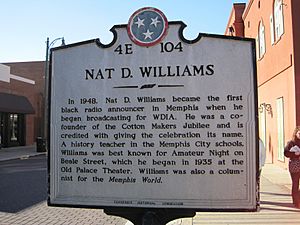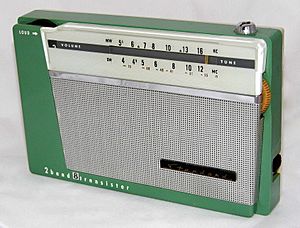Nat D. Williams facts for kids
Nathaniel Dowd Williams (born October 19, 1907 – died October 27, 1983) was a very important American teacher, radio host, and writer. People often called him Nat D. Williams or just Nat D.. He was born in Memphis, Tennessee, on a famous street called Beale Street.
Nat D. Williams was known for his cool and lively way of talking on the radio, which was called jive patter. Many African-Americans across the U.S. listened to his show. He helped change radio forever, leading to what became known as "Black appeal radio". This style later grew into the urban contemporary music format heard on Black radio stations in the 1960s and 1970s.
In 1948, Nat D. became the first African-American disc jockey in Memphis when he started working at radio station WDIA-AM. He is honored in the Memphis Music Hall of Fame and the Tennessee Radio Hall of Fame. In 2017, he was also added to the National Rhythm and Blues Hall of Fame. You can find a special historical marker on Beale Street, outside the old Palace Theater, where he often hosted events.
Contents
Early Life and Beginnings
Nat D. Williams was born on Beale Street in Memphis, which was a lively place known for its music. He went to college in Nashville, earning two degrees from Tennessee State University. This university is a public school and an HBCU, which means a Historically Black College or University.
After college, Nat D. returned to Memphis in 1930 and became a high school teacher at Booker T. Washington High School. He also wrote for a Black newspaper called Memphis World starting in 1928. Besides teaching and writing, Williams was the host, or Master of Ceremonies, for "Amateur Night" on Beale Street. He led a big show in 1935 at the Old Palace Theater.
Nat D. was not a musician himself, but he was great at promoting new talent, entertaining people, and guiding young Black artists. One of his students, Rufus Thomas, met Williams at Booker T. Washington High School. Williams taught Rufus about history and also helped him with comedy routines. After Rufus graduated, Williams brought him on as his helper for Amateur Night. Another of his students, Judge Benjamin Hooks, later became a leader in the NAACP, a group that works for civil rights.
In 1935, Nat D. Williams helped start the Cotton Makers Jubilee with Dr. Ransom Q. Venson. He even named this celebration! The Jubilee was a special event organized by the Black community during the Great Depression. It had Kings, Queens, and parades. It continued for many years, celebrating the city's history with cotton.
Making Waves at WDIA-AM
Nat D. Williams taught history in Memphis schools for 42 years. He was married and had three children, all while working as a teacher, a radio host, and an event organizer. He had a popular show at the Old Palace Theater called "Amateur Night on Beale Street." Two very famous people who performed there and became big stars were Elvis Presley and Riley King, who later became known as B.B. King. The audience at Amateur Night could be tough, but if you did well, your career could really take off!
Nat D. was a pioneer, meaning he was one of the first. He became a DJ at radio station WDIA and was one of the first Black announcers to broadcast from the South, where racial segregation was common. His show, Tan Town Jubilee, was heard across the Mississippi Delta region. It reached both Black and white listeners, introducing them to blues and gospel music. Other radio stations at the time mostly played jazz and swing, and they were owned and run by white people, even if they played Black music.
Nat D.'s show was so successful that WDIA changed its entire programming to an all-Black format. Before this, there were no openly promoted Black disc jockeys in the Southern U.S. By creating this new Memphis sound, WDIA started a trend of Black programming that spread across the South and Midwest. As a result, radio stations began hiring Black DJs instead of using white announcers to play Black music, and that's how Black appeal radio was born.
In the 1950s, both Rufus Thomas and Riley King (B.B. King) also became disc jockeys at WDIA. People, especially teens and young adults, started preferring recorded music from jukeboxes over live performances on the radio. The cool "jive talk" that DJs like Nat D. used between songs was fresh and came from Black culture. Surprisingly, this didn't turn off white listeners. In fact, it helped lead to the rise of rock and roll music! The new Memphis sound became very popular in the 1960s and 1970s, especially with Stax Records.
Later Work and Impact
As a journalist, Nat D. Williams wrote columns for different newspapers. One of his columns, Down on Beale, started in 1931. Another column, Dark Shadows, was written under the pen name D. Natural and ran from 1951 to 1971. In 1951, he joined a new Black newspaper in Memphis called the Tri-State Defender as its first city editor. His column A point of view began in 1966 and was published in Black newspapers all over the country.
At WDIA, Nat D. was like a guardian. He made sure that the song lyrics played on the station were appropriate for the audience and good for Black radio. He also helped preserve cultural history. Nat D. always showed up for his afternoon radio show. He stopped broadcasting in 1972 after having a stroke, and Rufus Thomas took over his spot on the air.
Death and Lasting Influence
Nat D. Williams passed away in 1983 and is buried in New Park Cemetery in Memphis.
His unique "jive talk" radio style influenced other stations, like WERD, which was the first Black-owned radio station and used a similar format with 'Jockey Jack' starting in 1949. Many famous musicians, including Elvis, Bobby Blue Bland, Rufus Thomas, and Riley King, got their start on Nat D.'s Amateur Night. Other radio DJs copied his style, and Black appeal radio became very popular. The Cotton Makers Jubilee was an important event in Memphis for over 30 years. Nat D. Williams was a history teacher who truly left his mark on music and culture. As he would say on the radio, Well, yes-siree, it's Nat Dee on the Jamboree, coming at thee on seventy-three (on the dial), WDIA. Now, whatchubet.
See also
- African American firsts
- Doctor Hep Cat
- Jack the Rapper
- Frankie Crocker
- Bob Perkins
- Vaughn Harper
- Yvonne Daniels
- Black-appeal stations
- WERD
- Glossary of jive talk
- Archives of African American Music and Culture



